Good academics, coupled with sound experience from employment / internships are always attractive to prospective employers. Students who have hands on experienced secure employment after graduation at a significantly higher rate than other students.
Summer Internship Reduced Tuition Option (SINT)Getting Credit for Internships
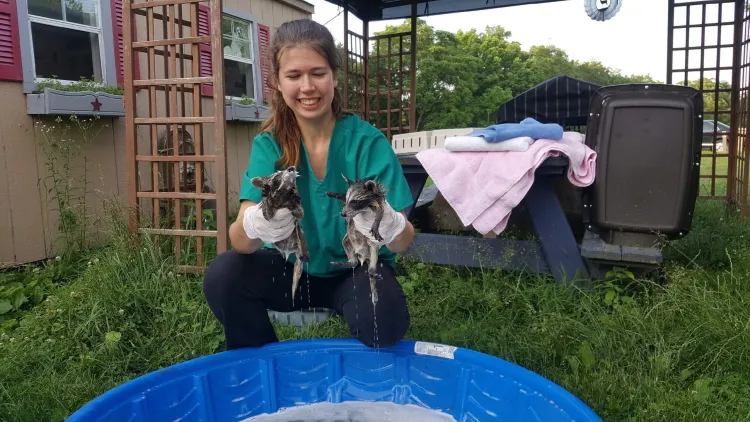
Riverglen Tigers in West Fork, AR
"I went to Riverglen not really knowing what to expect, but I came out with knowledge and experience unparalleled to any previous learning environment."
Tim Willard spent a month working at Riverglen Tigers, a tiger refugee sanctuary in West Fork, Arkansas.
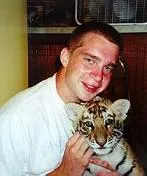
The Whale Center of New England
"It is difficult to decide the best experiences here at the Whale Center because I have loved every minute of it."
Laura Cupicha spent her summer doing field research for The Whale Center of New England, a non-profit organization dedicated to the research, conservation, and education of humpback whales in the Gulf of Maine.

Moose Haven Farm Internship
"This summer has been one of the most valuable and rewarding times of my life."
Katherine Carton-Bacon spent her summer working at Moose Haven Farm where she cared for sheep and goats.
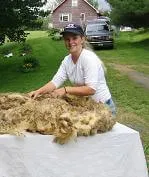
Internship Details
More student internship experiences
Sarah Henry
Participant in a veterinary experience internship.
In her junior year, Sarah knew she would have to take certain steps to show vet schools that her interest was marine mammals even though she was at a school with a large, domestic animal focus. When she saw Sea Life Park, Hawaii, had a veterinary experience internship for the spring semester, she knew that was what she wanted to do. She went to their website and applied. Their internships are ideal for students who love marine mammals and want hands–on experience working with them. Internships may also involve research projects within an assigned group. Those working within the marine mammals and our Reef Life departments will also have the opportunity to gain in-depth knowledge of animal training through a unique phase training program. This allows individuals to familiarize themselves with the training techniques and terminology used at Sea Life Park Hawai'i. All of their animal related internships require interns to participate in food preparation for the animals of the park, so applicants must be comfortable working with frozen fish.
"This is the most hands-on marine mammal training...you will also meet a great team of people with all levels of experience who are willing to help further your education on your career path. My only suggestion is to take advantage of every opportunity while you are out there and go out there with the goal to work for everything you learn. This easily was the beginning of the rest of my life and a very important stepping-stone in meeting my challenge of becoming a marine mammal veterinarian." — Sarah Henry
Internships include Marine Mammal Care and Training, Reef & Sea Turtle Care and Training, Seabird Care and Rehabilitation, Veterinary Technician, and Educator Experiences.
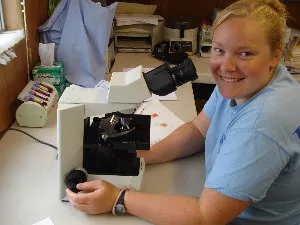
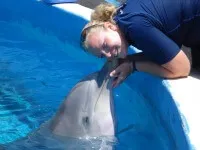
Zaya McSky
Intern at a African Wildlife Rehabilitation Center.
Knowing she wanted to work with big game, Zaya McSky looked online and found the African Conservation Experience which places volunteers at various conservation centers all focusing and working with animals. Through talking with other volunteers, she also learned about a capture team, Wildlife Translocation Services. She decided to spend two months in Africa and combine the two internships. African Conservation Experience has been sending volunteers to Africa for over a decade. They offer students the opportunity to work on game and natural reserves alongside Conservationists, Zoologists, Wildlife Veterinarians and Reserve Managers. They welcome volunteers from all backgrounds and countries with no previous experience necessary. Volunteer placements are from 1-3 months, and you can combine 2 or more projects in one trip.
"Tambotie is an animal rehab center completely run by the volunteers. You will learn an amazing amount about the animals at the center and around South Africa. I made amazing connections with the other volunteers and the animals there which included lions and monkeys among many other for me. The director, Petronel, is an amazing woman with so much knowledge, who gives the responsibility of the center solely to the volunteers. It can be very emotional work at times, especially when an animal is lost, so just be prepared." — Zaya McSky
"You really get a feel of what it is to work with a game capture team. From the very beginning you are completely involved with catching the animals. They were amazing with allowing me hands-on experience. I got to inject giraffes and rhinos with Penicillin! Be prepared for a small amount of physical work as you have to run at some points while catching." — Zaya McSky, on Wildlife translocation services
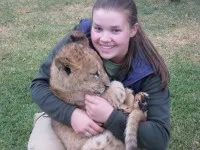
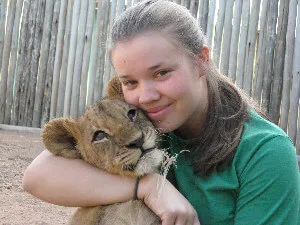
Katelyn Wuebbolt
Cincinnate Zoo.
Even though Katelyn lived in New Hampshire, she often visited her grandparents and other relatives in the Cincinnati area as going to the zoo had always been a family tradition. During her summer of 2007 visit, she requested information about various internship opportunities available at the zoo. She was referred to the zoo's web site and filled out an application.
"As an environmental educator, I had the opportunity to be a part of two worlds, because I had the chance to work with both animals and children. I was responsible for a group of children each week ranging in ages from 3-11 years old. Those responsibilities includes teaching and care taking of the children; that incorporated classroom learning, zoo hikes, and live animal demonstrations. The combination of animals and children at the Cincinnati Zoo and Botanical Gardens was an absolutely incredible and unforgettable experience. There are multiple skills that I have learned through this internship that I believe will help me have a competitive edge in the job world." - Katelyn Wuebbolt
Cincinnati Zoo offers three sessions a year, Winter, Summer, and Fall. An internship at the Cincinnati Zoo and Botanical Garden is very coveted and is a great asset to include on a resume.
The Cincinnati Zoo and Botanical Garden’s intern program offers a wide range of experiences in the areas of animal care, business, development, environmental education, group sales, horticulture, information technology, veterinary technology and wildlife research.
Animal Care (Unpaid) - Available during the summer session only: Interns working in the Animal Care departments have the opportunity to work under the supervision of experienced animal keepers. Interns help to maintain the animal collection by preparing diets, cleaning exhibits, shifting animals, and monitoring the health of the collection. Working with the keeper staff, interns gain experience in providing for the needs of exotic animals in captivity and acquire better understanding of the requirements of these animals. Interns are assigned to a morning and afternoon animal area and are working from the hours of 8:00am to 3:30pm, generally Monday-Friday, but some weekends may be required.
Check volunteering at Cincinati Zoo for the most current internships.
Cincinnati Zoo and Botanical Garden
3400 Vine Street
Cincinnati, Ohio 45220-1399
Phone: 513-281-4700
E-mail: volunteers@cincinnatizoo.org
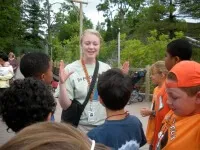
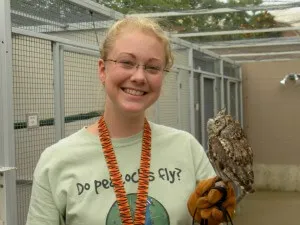
Academic credit and grading
Every internship experience is different. Therefore, requirements for setting up and carrying out internships for credit will vary. For example, expectations and requirements for a local internship for several credits that is part of your semester's course schedule will be quite different from a full-time internship carried out at a location that is off campus, out-of-state, or in another country.
ASCI internships may earn from 1 to 15 credits (most are 1-3). The number of credits assigned to a given internship will depend on the:
- Number of hours involved
- Nature and quality of the experience
- Responsibilities involved
- Type and quality of the learning that is likely to take place
A rule of thumb for local internships that involve substantially new experiences and learning is one credit per 45 hours of internship-related work during a full semester.
The majority of internships are established with "S/U" grading (satisfactory/unsatisfactory). In some cases a letter grade may be possible, for example, when the internship is carried out as part of an established internship program through an organization with well developed grading procedures (but this is rare).
Information on academic Internships at UVM.
Do's and Don'ts on finding an internship
Do start early in thinking about and exploring internships and off-campus learning opportunities. Beginning in your first year start thinking about types of work and field experiences, training and skills that would be of value to you in your education.
Some things you need to ask yourself before you start:- Is there more than one internship that you'd like to build into your program?
- Do you want an internship for a few credits? or more? (a full semester's worth?)Do you want to 'go away' for an internship?...or will you stay at UVM?
- Do you wish (or need) to be paid for the internship?
If you would like to talk to someone who can help you identify your needs and goals, contact and make an appointment with a faculty member, career counselor, or a member of the ASCI Internship Coordinator team.
- Do get in the habit of "networking."
Some suggestions:- Visit the UVM Career Services Office on campus and learn how to use their resources
- Visit with the ASCI Internship Coordinator
- Regularly visit and explore this ASCI Internship Webpage.
- Surf the Web
- Familiarize yourself with Internship and Career resources found in the UVM Library.
- Do contact people and organizations for information. For example, if you are interested in wildlife rehabilitation find out what organizations there are locally and nationally that are involved with this... write to them, phone them, email them... ask for their suggestions about internship opportunities in the field.
- Talk with family, friends, faculty, students.... anybody who might know of something or someone. Let them know what you are looking for. That's networking!
- If you do see something of interest (here or elsewhere), Don't procrastinate! Chances are you are not the only person interested. Write a letter, send an email, pick up the phone...take a first step!
- If you have been seeking an internship opportunity but have not been successful, or if you would like more information about locating internships, Do make an appointment with a member of the ASCI Internship Coordinator team
Internship opportunities abroad
If you are a UVM student interested in studying abroad, you should contact UVM's Office of International Education to find out which abroad programs are currently approved by UVM. What's listed below are opportunities for hands-on experience without taking classes. If you are a UVM student interested in receiving credit for any of these experiential learning opportunities, contact a member of the Internship Coordinator team when you apply. asci.internship@uvm.edu
Why do an internship?
- The UVM Animal and Veterinary Sciences Internship Program is an opportunity for students to receive college credit while receiving supervised practical experience in an on or off-campus animal-related profession.
- Good academics, coupled with sound experience from summer employment or internships are always attractive to prospective employers.
- Students who have experienced an internship secure employment after graduation (often with their former internship provider) at a significantly higher rate than other students.
The UVM Department of Animal Science Internship Program is committed to providing students with work-related experiences relevant to their educational and career goals.
Resources and strategies for finding internships
Handshake
See Career center website for details
Professional and Trade Associations
There are tens of thousands of trade and professional associations and societies around the country and the world serving virtually every field and area of interest. People, companies, institutions, and organizations actively involved in any field or industry are members of such associations.
Associations are great sources of information and contacts. For example, if you are interested in a pet food company internship (either in sales or research) there is the Pet Food Institute to which big and small companies belong. Many associations have websites that are extremely useful, with links to their members' websites. Contacting the association could very well yield leads and ideas for finding openings with one or more of its members.
Internet Forums
There are thousands of Internet forums on the web pertaining to every imaginable subject. People all over the world with personal interest and professional involvement in a field belong to these forums and regularly post information, advice and help. A message asking about internships sent to such a forum can put you in touch with people who can provide leads and information about internships. If you Google "xxxforum" (ie., wildlife conservation forum) you are most likely going to find a forum to join. Try it!
Businesses and Organization
Many small and larger businesses–tack shops, stables, farms, veterinary clinics, etc.–which have never had, or even thought about having an intern respond positively when contacted by students seeking internships in their 'line of work'. If you have a particular interest for example, in learning about the business of boarding kennels–ask around to find out which are the most reputable and professional kennels in the area. Contact, or better yet, visit, them and speak with the owner or manager. You'll be surprised at how many opportunities present themselves!
Financial Support
Some internships provide interns with a salary or wage. Such internships are usually found in companies and businesses -- both large and small. Usually internship providers who provide a wage or compensation will make this known in any materials or information about the internship.
But, many internships -- the majority really -- do not provide compensation. What to do? Here are some suggestions:
- Sometimes a company or organization will agree to provide some compensation to individuals who express the need. It depends on the circumstances. It never hurts to ask.
- Industry groups, professional organizations and associations in many fields are often willing to provide financial support for students wishing to do interesting and worthwhile internships in their field. Try to think of such organizations either in the UVM area or near your home. (Ask professors, people working in the field, etc. for leads.) Contact them to inquire about the possibility for financial support. For example, if you are planning a dairy internship, you can contact the Vermont Dairy Industry Association to see if they would consider a request for support.
- Likewise, many fraternal, religious, and community organizations often provide stipends to support the education of students who reside in their community area. Ask family, friends, etc. about these organizations. Contact them to inquire about opportunities for support. For example, community Rotary Clubs routinely consider requests for such support.
- Contact UVM's Career Services office for additional ideas for finding financial support.
- Note for UVM Work/Study Students: Students with WorkStudy support here at UVM can work at non-profit organizations -- such as the Humane Society of Chittenden County -- and receive their work-study wages. This work can, in many circumstances, also be an internship and yield academic credit. Speak with a member of the Internship Coordinator team, if you are interested in this possibility
When should I do an internship?
Any time of the year!
I volunteered/worked at an internship this past summer? May I receive credit for this experience now?
No, a student must contact the ASCI Internship Coordinator and fill out the on-line internship worksheet prior to starting the internship!
Even if you can't get university credit it is often still worth while to write a reflection paper about your experience to put in a portfolio if you plan to apply to vet school/Grad school or want it as additional material in a job application. Doing this right after you complete your internship is important so you don't forget important details. You can always have a faculty advisor or someone from the writing center look over the paper once you are done.
Resources
Visit the UVM Career Center
UVM Career Center: The Career Center at UVM has many resources to help you start the internship search process
Network
LinkedIn: UVM's LinkedIn Page is a great way to connect with alumni and discover potential internship offerings
UVMConnect: Connect with UVM Alumni who are eager to assist you with career development and exploration
Investigate Internship Funding
UVM Summer Internship Scholarship: These scholarship provide money to defray the costs of summer internships
Contact
Office hours: If you would like help or additional information you are encouraged to make an appointment with Lee Andors in Room 102 Terrill Building by emailing ASCI.Internship@uvm.edu.